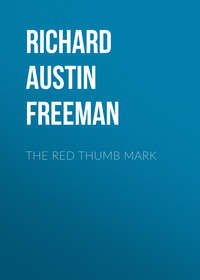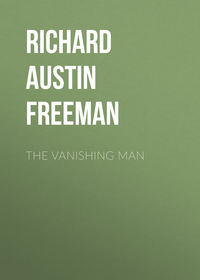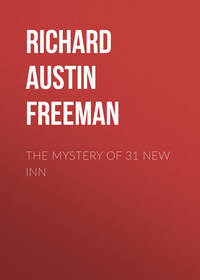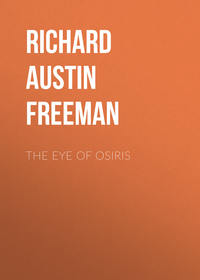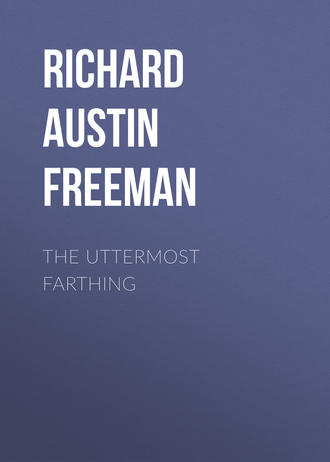 полная версия
полная версияThe Uttermost Farthing
"The hours passed on unreckoned until pencils of cold blue daylight began to stream in through the chinks of the shutters and contend with the warm gaslight within. Then another footstep was heard on the stairs and the cook, Wilson, came into the room. She, like the housemaid, stopped dead when she saw my wife's corpse, and stood for an instant staring wildly with her mouth wide open. But only for an instant. The next she was flying out of the front door, rousing the street with her screams.
"The advent of the cook roused me. I knew that the police would arrive soon and I instinctively looked about me to see how this unspeakable thing had happened. I had already noticed that one of my wife's hands—the one that I had not been holding—was clenched, and I now observed that it grasped a little tuft of hair. I drew out a portion of the tuft and looked at it. It was coarse hair, about three inches long and a dull gray in color. I laid it on the clean note-paper in the drawer of the bureau bookcase to examine later, and then glanced around the room. The origin of the tragedy was obvious. The household plate had been taken out of the plate chest in the pantry and laid out on the end of the dining table. There the things stood, their polished surfaces sullied by the greasy finger-marks of the wretch who had murdered my wife. At those tell-tale marks I looked with new and growing interest. Finger-prints, in those days, had not yet been recognized by the public or the police as effective means of identification. But they were well known to scientific men and I had given the subject some attention myself. And the sight of those signs-manual of iniquity had an immediate effect on me; they converted the unknown perpetrator of this horror from a mere abstraction of disaster into a real, living person. With a sudden flush of hate and loathing, I realized that this wretch was even now walking the streets or lurking in his accursed den; and I realized, too, that these marks were, perhaps, the only links that connected him with the foul deed that he had done.
"I looked over the plate quickly and selected a salver and a large, globular teapot, on both of which the prints were very distinct. These I placed in a drawer of the bureau, and, turning the key, dropped it into the pocket of my pajamas. And at that moment the bell rang violently.
"I went to the door and admitted a police constable and the cook. The latter looked at me with evident fear and horror and the constable said, somewhat sternly:
"'This young woman tells me there's something wrong here, sir.'
"I led him into the dining-room—the cook remained at the door, peering in with an ashen face—and showed him my wife's corpse. He took off his helmet and asked rather gruffly how it happened. I gave him a brief account of the catastrophe, on which he made no comment except to remark that the inspector would be here presently.
"The inspector actually arrived within a couple of minutes, accompanied by a sergeant, and the two officers questioned me closely. I repeated my statement and saw at once that they did not believe me; that they suspected me of having committed the murder myself. I noted the fact with dull surprise but without annoyance. It didn't seem to matter to me what they thought.
"They called the cook in and questioned her, but, of course, she knew nothing. Then they sent her to find the housemaid. But the housemaid had disappeared and her outdoor clothes and a large hand-bag had disappeared too; which put a new complexion on the matter. Then the officers examined the plate and looked at the finger-marks on it. The constable discovered the tuft of hair in my poor wife's hand, and the inspector having noted its color and looked rather hard at my hair, put it for safety in a blue envelope, which he pocketed; and I suspect it never saw the light again.
"About this time the police surgeon arrived, but there was nothing for him to do but note the state of the body as bearing on the time at which death took place. The police took possession of some of the plate with a dim idea of comparing the finger-prints with the fingers of the murderer if they should catch him.
"But they never did catch him. Not a vestige of a clue to his identity was ever forthcoming. The housemaid was searched for but never found. The coroner's jury returned a verdict of 'wilful murder' against some person unknown. And that was the end of the matter. I accompanied my dearest to the place where she was laid to rest, where soon I shall join her. And I came back alone to the empty house.
"It is unnecessary for me to say that I did not kill myself. In the interval I had seen things in a new light. It was evident to me from the first that the police would never capture that villain. And yet he had to be captured. He had incurred a debt, and that debt had to be paid. Therefore I remained behind to collect it.
"That was twenty years ago, Wharton; twenty long, gray, solitary years. Many a time have I longed to go to her, but the debt remained unpaid. I have tried to make the time pass by getting my little collection together and studying the very instructive specimens in it; and it has lightened the burden. But all the time I have been working to collect that debt and earn my release."
He paused awhile, and I ventured to ask: "And is the debt paid?"
"At last it is paid."
"The man was caught, then, in the end?"
"Yes. He was caught."
"And I hope," I exclaimed fervently, "that the scoundrel met with his deserts; I mean, that he was duly executed."
"Yes," Challoner answered quietly, "he was executed."
"How did the police discover him, after all?" I asked.
"You will find," said Challoner, "a full account of the affair in the last volume of the 'Museum Archives';" then, noting the astonishment on my face at this amazing statement, he added: "You see, Wharton, the 'Museum Archives' are, in a sense, a personal diary; my life has been wrapped up in the museum and I have associated all the actions of my life with the collection. I think you will understand when you read it. And now let us dismiss these recollections of a ruined life. I have told you my story; I wanted you to hear it from my own lips, and you have heard it. Now let us take a glass of wine and talk of something else."
I looked at my watch and, finding it much later than I had supposed, rose to take my leave.
"I oughtn't to have kept you up like this," I said. "You ought to have been in bed an hour ago."
Challoner laughed his queer muffled laugh. "Bed!" exclaimed he. "I don't go to bed nowadays. Haven't been able to lie down for the last fortnight."
Of course he hadn't. I might have known that. "Well," I said, "at any rate, let me make you comfortable for the night before I go. How do you generally manage?"
"I rig up a head-rest on the edge of the table, pull up the armchair, wrap myself in a rug and sleep leaning forward. I'll show you. Just get down Owen's 'Comparative Anatomy' and stack the volumes close to the edge of the table. Then set up Parker's 'Monograph on the Shoulder-girdle' in a slanting position against them. Fine book, that of Parker's. I enjoyed it immensely when it first came out and it makes a splendid head-rest. I'll go and get into my pajamas while you are arranging the things."
He went off to his adjacent bedroom and I piled up the ponderous volumes on the table and drew up the armchair. When he returned, I wrapped him in a couple of thick rugs and settled him in his chair. He laid his arms on the massive monograph, rested his forehead on them and murmured cheerfully that he should now be quite comfortable until the morning. I wished him "good-night" and walked slowly to the door, and as I held it open I stopped to look back at him. He raised his head and gave me a farewell smile; a queer, ugly smile, but full of courage and a noble patience. And so I left him.
Thereafter I called to see him every day and settled him to rest every night. His disease made more rapid progress even than I had expected; but he was always bright and cheerful, never made any complaint and never again referred to his troubled past.
One afternoon I called a little later than usual, and when the housemaid opened the door I asked her how he was.
"He isn't any better, sir," she answered. "He's getting most awful fat, sir; about the head I mean."
"Where is he now?" I asked.
"He's in the dining-room, sir; I think he's gone to sleep."
I entered the room quietly and found him resting by the table. He was wrapped up in his rugs and his head rested on his beloved monograph. I walked up to him and spoke his name softly, but he did not rouse. I leaned over him and listened, but no sound or movement of breathing was perceptible. The housemaid was right. He had gone to sleep; or, in his own phrase, he had passed out of the domain of sorrow.
II
"NUMBER ONE"
It was more than a week after the funeral of my poor friend Humphrey Challoner that I paid my first regular visit of inspection to his house. I had been the only intimate friend of this lonely, self-contained man and he had made me not only his sole executor but his principal legatee. With the exception of a sum of money to endow an Institute of Criminal Anthropology, he had made me the heir to his entire estate, including his museum. The latter bequest was unencumbered by any conditions. I could keep the collection intact, I could sell it as it stood or I could break it up and distribute the specimens as I chose; but I knew that Challoner's unexpressed wish was that it should be kept together, ultimately to form the nucleus of a collection attached to the Institute.
It was a gray autumn afternoon when I let myself in. A caretaker was in charge of the house, which was otherwise unoccupied, and the museum, which was in a separate wing, seemed strangely silent and remote. As the Yale latch of the massive door clicked behind me, I seemed to be, and in fact was, cut off from all the world. A mysterious, sepulchral stillness pervaded the place, and when I entered the long room I found myself unconsciously treading lightly so as not to disturb the silence; even as one might on entering some Egyptian tomb-chamber hidden in the heart of a pyramid.
I halted in the center of the long room and looked about me, and I don't mind confessing that I felt distinctly creepy. It was not the skeleton of the whale that hung overhead, with its ample but ungenial smile; it was not the bandy-legged skeleton of the rachitic camel, nor that of the aurochs, nor those of the apes and jackals and porcupines in the smaller glass case; nor the skulls that grinned from the case at the end of the room. It was the long row of human skeletons, each erect and watchful on its little pedestal, that occupied the great wall-case: a silent, motionless company of fleshless sentinels, standing in easy postures with unchanging, mirthless grins and seeming to wait for something. That was what disturbed me.
I am not an impressionable man; and, as a medical practitioner, it is needless to say that mere bones have no terrors for me. The skeleton from which I worked as a student was kept in my bedroom, and I minded it no more than I minded the plates in "Gray's Anatomy." I could have slept comfortably in the Hunterian Museum—other circumstances being favorable; and even the gigantic skeleton of Corporal O'Brian—which graces that collection—with that of his companion, the quaint little dwarf, thrown in, would not have disturbed my rest in the smallest degree. But this was different. I had the feeling, as I had had before, that there was something queer about this museum of Challoner's.
I walked slowly along the great wall-case, looking in at the specimens; and in the dull light, each seemed to look out at me as I passed with a questioning expression in his shadowy eye-sockets, as if he would ask, "Do you know who I was?" It made me quite uncomfortable.
There were twenty-five of them in all. Each stood on a small black pedestal on which was painted in white a number and a date; excepting one at the end, which had a scarlet pedestal and gold lettering. Number 1 bore the date 20th September, 1889, and Number 25 (the one with the red pedestal) was dated 13th May, 1909. I looked at this last one curiously; a massive figure with traces of great muscularity, a broad, Mongoloid head with large cheekbones and square eye-sockets. A formidable fellow he must have been; and even now, the broad, square face grinned out savagely from the case.
I turned away with something of a shudder. I had not come here to get "the creeps." I had come for Challoner's journal, or the "Museum Archives" as he called it. The volumes were in the secret cupboard at the end of the room and I had to take out the movable panel to get at them. This presented no difficulty. I found the rosettes that moved the catches and had the panel out in a twinkling. The cupboard was five feet high by four broad and had a well in the bottom covered by a lid, which I lifted and, to my amazement, found the cavity filled with revolvers, automatic pistols, life-preservers, knuckle-dusters and other weapons, each having a little label—bearing a number and a date—tied neatly on it. I shut the lid down rather hastily; there was something rather sinister in that collection of lethal appliances.
The volumes, seven in number, were on the top shelf, uniformly bound in Russia leather and labeled, respectively, "Photographs," "Finger-prints," "Catalogue," and four volumes of "Museum Archives." I was about to reach down the catalogue when my eye fell on the pile of shallow boxes on the next shelf. I knew what they contained and recalled uncomfortably the strange impression that their contents had made on me; and yet a sort of fascination led me to take down the top one—labelled "Series B 5"—and raise the lid. But if those dreadful dolls' heads had struck me as uncanny when poor Challoner showed them to me, they now seemed positively appalling. Small as they were—and they were not as large as a woman's fist—they looked so life-like—or rather, so death-like—that they suggested nothing so much as actual human heads seen through the wrong end of a telescope. There were five in this box, each in a separate compartment lined with black velvet and distinguished by a black label with white lettering; excepting the central one, which rested on scarlet velvet and had a red label inscribed in gold "13th May, 1909."
I gazed at this tiny head in its scarlet setting with shuddering fascination. It had a hideous little face; a broad, brutal face of the Tartar type; and the mop of gray-brown hair, so unhuman in color, and the bristling mustache that stood up like a cat's whiskers, gave it an aspect half animal, half devilish. I clapped the lid on the box, thrust it back on the shelf, and, plucking down the first volume of the "Archives," hurried out of the museum.
That night, when I had rounded up the day's work with a good dinner, I retired to my study, and, drawing an armchair up to the fire, opened the volume. It was a strange document. At first I was unable to perceive the relevancy of the matter to the title, for it seemed to be a journal of Challoner's private life; but later I began to see the connection, to realize, as Challoner had said, that the collection was nothing more than a visible commentary on and illustration of his daily activities.
The volume opened with an account of the murder of his wife and the circumstances leading up to it, written with a dry circumstantiality that was to me infinitely pathetic. It was the forced impassiveness of a strong man whose heart is breaking. There were no comments, no exclamations; merely a formal recital of facts, exhaustive, literal and precise. I need not quote it, as it only repeated the story he had told me, but I will commence my extract at the point where he broke off. The style, as will be seen, is that of a continuous narrative, apparently compiled from a diary; and, as it proceeds, marking the lapse of time, the original dryness of manner gives place to one more animated, more in keeping with the temperament of the writer.
"When I had buried my dear wife, I waited with some impatience to see what the police would do. I had no great expectations. The English police system is more adjusted to offences against property than to those against the person. Nothing had been stolen, so nothing could be traced; and the clues were certainly very slight. It soon became evident to me that the authorities had given the case up. They gave me no hope that the murderer would ever be identified; and, in fact, it was pretty obvious that they had written the case off as hopeless and ceased to interest themselves in it.
"Of course I could not accept this view. My wife had been murdered. The murder was without extenuation. It had been committed lightly to cover a paltry theft. Now, for murder, no restitution is possible. But there is an appropriate forfeit to be paid; and if the authorities failed to exact it, then the duty of its exaction devolved upon me. Moreover, a person who thus lightly commits murder as an incident in his calling is unfit to live in a community of human beings. It was clearly my duty as a good citizen to see that this dangerous person was eliminated.
"This was well enough in theory, but its realization in practice presented considerable difficulties. The police had (presumably) searched for this person and failed to find him. How was I, untrained in methods of detection, to succeed where the experts had been baffled? I considered my resources. They consisted of a silver teapot and a salver which had been handled by the murderer and which, together, yielded a complete set of finger-prints, and the wisp of hair that I had taken from the hand of my murdered wife. It is true that the police also had finger-marked plate and the remainder of the hair and had been unable to achieve anything by their means; but the value of finger-impressions for the purposes of identification is not yet appreciated outside scientific circles.1 I fetched the teapot and salver from the drawer in which I had secured them and examined them afresh. The teapot had been held in both hands and bore a full set of prints; and these were supplemented by the salver. For greater security I photographed the whole set of the finger-impressions and made platinotype prints which I filed for future reference. Then I turned my attention to the hair. I had already noticed that it was of a dull gray color, but now, when I came to look at it more closely, I found the color so peculiar that I took it to the window and examined it with a lens.
"The result was a most startling discovery. It was ringed hair. The gray appearance was due, not to the usual mingling of white and dark hairs, but to the fact that each separate hair was marked by alternate rings of black and white. Now, variegated hairs are common enough in the lower animals which have a pattern on the fur. The tabby cat furnishes a familiar example. But in man the condition is infinitely rare; whence it was obvious that, with these hairs and the finger-prints, I had the means of infallible identification. But identification involves possession of the person to be identified. There was the difficulty. How was it to be overcome?
"Criminals are vermin. They have the typical characters of vermin; unproductive activity combined with disproportionate destructiveness. Just as a rat will gnaw his way through a Holbein panel, or shred up the Vatican Codex to make a nest, so the professional criminal will melt down priceless medieval plate to sell in lumps for a few shillings. The analogy is perfect.
"Now, how do we deal with vermin—with the rat, for instance?
"Do we go down his burrow and reason with him? Do we strive to elevate his moral outlook? Not at all. We induce him to come out. And when he has come out, we see to it that he doesn't go back. In short, we set a trap. And if the rat that we catch is not the one that we wanted, we set it again.
"Precisely. That was the method.
"My housemaid had absconded at the time of the murder; she was evidently an accomplice of the murderer. My cook had left on the same day, having conceived a not unnatural horror of the house. Since then I had made shift with a charwoman. But I should want a housemaid and a cook, and if I acted judiciously in the matter of references, I might get the sort of persons who would help my plans. For there are female rats as well as male.
"But there were certain preliminary measures to be taken. My physical condition had to be attended to. As a young man I was a first-class athlete, and even now I was strong and exceedingly active. But I must get into training and brush up my wrestling and boxing. Then I must fit up some burglar alarms, lay in a few little necessaries and provide myself with a suitable appliance for dealing with the 'catch.'
"This latter I proceeded with at once. To the end of a rod of rhinoceros horn about two feet long I affixed a knob of lead weighing two pounds. I covered the knob with a thickish layer of plaited horsehair, and over this fastened a covering of stout leather; and when I had fitted it with a wrist-strap it looked a really serviceable tool. Its purpose is obvious. It was an improved form of that very crude appliance, the sand-bag, which footpads use to produce concussion of the brain without fracturing the skull. I may describe it as a concussor.
"The preliminary measures were proceeding steadily. I had put in a fortnight's attendance at a gymnasium under the supervision of Professor Schneipp, the Bavarian Hercules; I had practiced the most approved 'knock-outs' known to my instructor, the famous pugilist, Melchizedeck Cohen (popularly known as 'Slimy' Cohen); I had given up an hour a day to studying the management of the concussor with the aid of a punching-ball; the alarms were ready for fixing, and I even had the address of an undoubtedly disreputable housemaid, when a most unexpected thing happened. I got a premature bite. A fellow actually walked into the trap without troubling me to set it.
"It befell thus. I had gone to bed rather early and fallen asleep at once, but about one o'clock I awoke with that unmistakable completeness that heralds a sleepless night. I lit my candle-lamp and looked round for the book that I had been reading in the evening, and then I remembered that I had left it in the museum. Now that book had interested me deeply. It contained the only lucid description that I had met with of the Mundurucú Indians and their curious method of preserving the severed heads of their enemies; a method by which the head—after removal of the bones—was shrunk until it was no larger than a man's fist.
"I got up, and, taking my lamp and keys, made my way to the museum wing of the house, which opened out of the dining-room. I found the book, but, instead of returning immediately, lingered in the museum, looking about the great room and at the unfinished collection and gloomily recalling its associations. The museum was a gift from my wife. She had built it and the big laboratory soon after we were married and many a delightful hour we had spent in it together, arranging the new specimens in the cases. I did not allow her to work in the evil-smelling laboratory, but she had a collection of her own, of land and fresh-water shells (which were cleaner to handle than the bones); and I was pulling out some of the drawers in her cabinet, and, as I looked over the shells, thinking of the happy days when we rambled by the riverside or over furzy commons in search of them, when I became aware of faint sounds of movement from the direction of the dining-room.
"I stepped lightly down the corridor that led to the dining-room and listened. The door of communication was shut, but through it I could distinctly hear someone moving about and could occasionally detect the chink of metal. I ran back to the museum—my felt-soled bedroom slippers made no sound—and, taking the 'concussor' from the drawer in which I had concealed it, thrust it through the waist-band of my pajamas. Then I crept back to the door.
"The sounds had now ceased. I inferred that the burglar—for he could be none other—had gone to the pantry, where the plate-chest was kept. On this I turned the Yale latch and softly opened the door. It is my habit to keep all locks and hinges thoroughly oiled, and consequently the door opened without a sound. There was no one in the dining-room; but one burner of the gas was alight and various articles of silver plate were laid on the table, just as they had been when my wife was murdered. I drew the museum door to—I could not shut it because of the noise the spring latch would have made—and slipped behind a Japanese screen that stood near the dining-room door. I had just taken my place when a stealthy footstep approached along the hall. It entered the room and then there was a faint clink of metal. I peeped cautiously round the screen and looked on the back of a man who was standing by the table on which he was noiselessly depositing a number of spoons and forks and a candlestick. Although his back was towards me, a mirror on the opposite wall gave me a good view of his face; a wooden, expressionless face, such as I have since learned to associate with the English habitual criminal; the penal servitude face, in fact.


